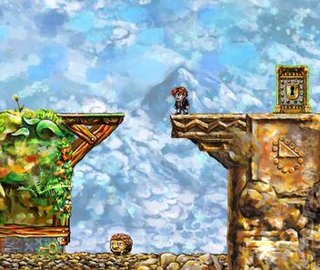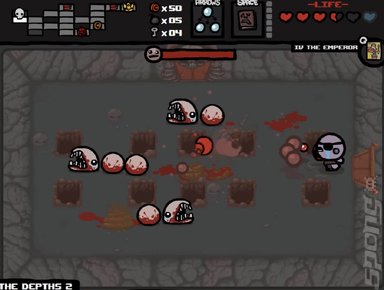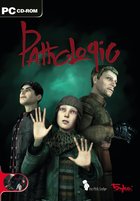There's endless debate over the word 'Indie' (aka Independent). What constitutes an Indie developer? Is there an Indie mentality? Is there an Indie aesthetic? Can only Indie developers make Indie games, or can big publishers do them too? Can you stop being Indie? Could self-owned companies like Valve and Epic still be Indies?
I tried racking my brain to think when I first heard the phrase 'Indie Game'; it's strange, I remember flash games and self-publishing back when I worked on PC Format, but never "Indie game".
I don't even remember categorising developers like that when I was a gamer, before I became a journalist. As a kid, I just thought about shareware games and boxed games, but I didn't value one over the other - we only played the shareware stuff because we were skint and we couldn't pirate anything back then (except when my friend from Hong Kong came back). I probably first heard the phrase 'Indie Games' from RockPaperShotgun or GameSetWatch.
Though the IGF (Independent Game Festival) has been going since 1999, Google Trends doesn't track the phrase "indie game" back before 2007 - the search traffic was too small. Similarly, Google Books doesn't show much until PC Gamer in 2007. Perversely, only with the advent of Xbox Live Indie games in 2008 does the phrase hook into the public consciousness, increasing in search traffic tenfold.
Given the dominance of publishers and the lack of a distribution system until the mid-2000s, there wasn't a need for a phrase like "indie game" until Kongregate and Steam came along.
Until that point, you just couldn't make any money developing something for non-physical distribution. You could put your mod on Fileplanet, sure, but you couldn't charge for it like on Steam, or make money out of ads like with Kongregate. Profitable Indie games only really arrived with Steam and the iPhone.
It's interesting that, talking to Indie developers now, something similar is developing again. They feel now that they need an 'in' with Valve, otherwise there's no point producing anything on the PC platform.
The market is closing up again because Valve doesn't have a clear avenue for submitting games onto their platform. Indeed, talking to Valve, you find that they decide what goes on Steam in informal daily meetings that anyone can take part in - it fits with their informal corporate policies, but not with the needs of independent developers.
To some extent, the word Indie comes just from that feeling the first few Indie developers had, of being independent of publisher control. The manipulations and cruelties many publishers inflicted on third-party developers have become legendary.
Take, for example, LucasArts' behaviour towards Free Radical, as revealed in Rich Stanton's superb investigative piece for Eurogamer back in May, or how Team Meat were treated by Microsoft whilst developing Super Meat Boy. Believe me - knowing people in the industry, this the tip of the iceberg. There is a lot more dirt to come out. Developers have good reason to shout about finally achieving their independence from publishers.
So if the only defining aspect of an Indie is that itís independent of publisher pressure, what does that say about the games it produces? First, it says that they aren't necessarily mainstream. Publishers tend to pressurise developers towards established genres and away from risks (though not away from controversy, as that generates news, which generates sales).
Secondly, it says that, unless Indie developers have an outside reason to invest in graphics technology, they won't. It's much easier to avoid true 3D and generate 2D art anyway; but with the profusion of self-trained digital artists around now, it's even more tempting to stick to 2D. It's much cheaper and also easier to make something distinctive with 2D, especially pixel art, and there's the added benefit that it feeds into the nostalgia of older gamers, who have the larger disposable income to gamble on games.
Thirdly, it might be challenging to gamers emotionally or just difficult to play. Games that remind gamers of their mortality or make them deal with moral conflicts in their own lives do not tend to attract multi-million dollar budgets. Nor do games like Ice Pick Lodge's Pathologic, which is Brechtian and surrealist, or Jonathan Blow's Braid, which plays with time and narrative, or Ed McMullen's The Binding of Isaac, which deals lightheartedly with child abuse, matricide and abortion. Indie games are heart-on-sleeve and rough, at their best.
These qualities aren't unique to games made by Indie developers, but they do form something like a rough aesthetic of Indie games: non-mainstream genres, with distinctive art and challenging content.
The mainstream publishers do make games like these - as Rob Reardon of Retro Remakes pointed out to us LucasArts attempted Lucidity - but the deliberately rough edges that are the most endearing part of the project are smoothed out. Braid without its depressing ending would have been nothing. The Binding of Isaac without its darkness would just have been irritating. Pathologic with... a manual? Large publishers producers, managers and QA teams would have brought these games back to the mainstream and mostly ruined them in the process.
Are there companies that donít look like Indies, but are? Valveís drive for innovation and internal structure means that they probably still are (though DOTA 2 and Portal 2 were both awfully safe for them). Epicís self-ownership and determined art aesthetic makes them a borderline case.
Tell us what you think in our Free and Frank Forum.
I tried racking my brain to think when I first heard the phrase 'Indie Game'; it's strange, I remember flash games and self-publishing back when I worked on PC Format, but never "Indie game".
I don't even remember categorising developers like that when I was a gamer, before I became a journalist. As a kid, I just thought about shareware games and boxed games, but I didn't value one over the other - we only played the shareware stuff because we were skint and we couldn't pirate anything back then (except when my friend from Hong Kong came back). I probably first heard the phrase 'Indie Games' from RockPaperShotgun or GameSetWatch.
Though the IGF (Independent Game Festival) has been going since 1999, Google Trends doesn't track the phrase "indie game" back before 2007 - the search traffic was too small. Similarly, Google Books doesn't show much until PC Gamer in 2007. Perversely, only with the advent of Xbox Live Indie games in 2008 does the phrase hook into the public consciousness, increasing in search traffic tenfold.
Given the dominance of publishers and the lack of a distribution system until the mid-2000s, there wasn't a need for a phrase like "indie game" until Kongregate and Steam came along.
Until that point, you just couldn't make any money developing something for non-physical distribution. You could put your mod on Fileplanet, sure, but you couldn't charge for it like on Steam, or make money out of ads like with Kongregate. Profitable Indie games only really arrived with Steam and the iPhone.
It's interesting that, talking to Indie developers now, something similar is developing again. They feel now that they need an 'in' with Valve, otherwise there's no point producing anything on the PC platform.
The market is closing up again because Valve doesn't have a clear avenue for submitting games onto their platform. Indeed, talking to Valve, you find that they decide what goes on Steam in informal daily meetings that anyone can take part in - it fits with their informal corporate policies, but not with the needs of independent developers.
To some extent, the word Indie comes just from that feeling the first few Indie developers had, of being independent of publisher control. The manipulations and cruelties many publishers inflicted on third-party developers have become legendary.
Take, for example, LucasArts' behaviour towards Free Radical, as revealed in Rich Stanton's superb investigative piece for Eurogamer back in May, or how Team Meat were treated by Microsoft whilst developing Super Meat Boy. Believe me - knowing people in the industry, this the tip of the iceberg. There is a lot more dirt to come out. Developers have good reason to shout about finally achieving their independence from publishers.
So if the only defining aspect of an Indie is that itís independent of publisher pressure, what does that say about the games it produces? First, it says that they aren't necessarily mainstream. Publishers tend to pressurise developers towards established genres and away from risks (though not away from controversy, as that generates news, which generates sales).
Secondly, it says that, unless Indie developers have an outside reason to invest in graphics technology, they won't. It's much easier to avoid true 3D and generate 2D art anyway; but with the profusion of self-trained digital artists around now, it's even more tempting to stick to 2D. It's much cheaper and also easier to make something distinctive with 2D, especially pixel art, and there's the added benefit that it feeds into the nostalgia of older gamers, who have the larger disposable income to gamble on games.
Thirdly, it might be challenging to gamers emotionally or just difficult to play. Games that remind gamers of their mortality or make them deal with moral conflicts in their own lives do not tend to attract multi-million dollar budgets. Nor do games like Ice Pick Lodge's Pathologic, which is Brechtian and surrealist, or Jonathan Blow's Braid, which plays with time and narrative, or Ed McMullen's The Binding of Isaac, which deals lightheartedly with child abuse, matricide and abortion. Indie games are heart-on-sleeve and rough, at their best.
These qualities aren't unique to games made by Indie developers, but they do form something like a rough aesthetic of Indie games: non-mainstream genres, with distinctive art and challenging content.
The mainstream publishers do make games like these - as Rob Reardon of Retro Remakes pointed out to us LucasArts attempted Lucidity - but the deliberately rough edges that are the most endearing part of the project are smoothed out. Braid without its depressing ending would have been nothing. The Binding of Isaac without its darkness would just have been irritating. Pathologic with... a manual? Large publishers producers, managers and QA teams would have brought these games back to the mainstream and mostly ruined them in the process.
Are there companies that donít look like Indies, but are? Valveís drive for innovation and internal structure means that they probably still are (though DOTA 2 and Portal 2 were both awfully safe for them). Epicís self-ownership and determined art aesthetic makes them a borderline case.
Tell us what you think in our Free and Frank Forum.
The opinion expressed in this article is that of the author and does not reflect those of SPOnG.com except when it does.
Want to vent your gaming spleen? Send 900 words max of well thought-out, deeply analysed opinion and we may even run it. Send in 900 words of incisive but mostly brutally angry invective, and we almost certainly will.
Read More Like This
Comments
only hacks and rip off artists are indies
I think the first time I'd read the term in a magazine was with Stu's Indie Zone features. That was, what? 2004-ish.





